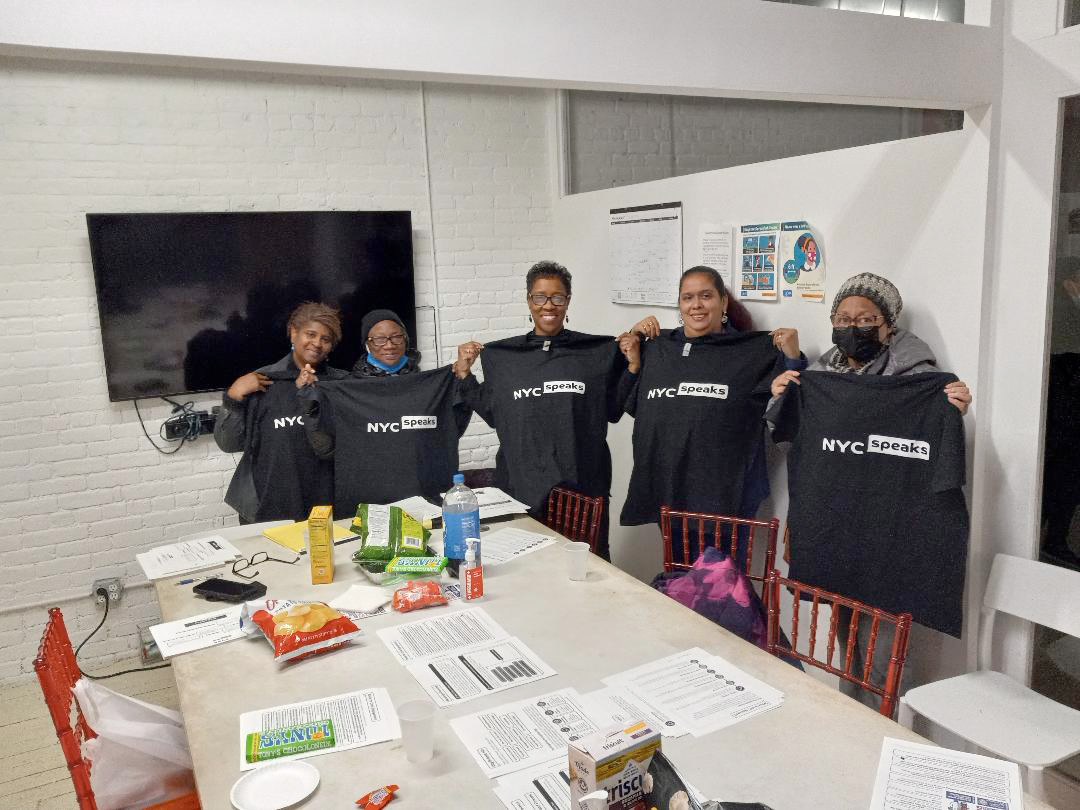
Survey Data at a Glance
NYC Speaks Survey Findings at a Glance
Here’s what we learned from New Yorkers about where they most want to see this administration take action:
Housing
- Across all income levels and races, New Yorkers named housing as their first priority for creating safe neighborhoods, with the exception of AAPI respondents earning under $35K/year ranking “more police presence” first and housing second.
- New Yorkers continue to prioritize housing as an issue overall, emphasizing a need to preserve affordability while making housing safer.
- Housing resources were cited as a top choice for content in a centralized app and website of City services.
Safety
- Adult respondents supported a multi-faceted approach to public safety.
- After housing, adults earning less than $35K/year emphasized a need for more police while those earning over $35K/year prioritized mental health and first responders.
- Increased police presence is a top priority for middle-aged New Yorkers and homeowners.
- Youth respondents placed greater emphasis on public design and improving police-community relations, over increased police presence.
- Black respondents earning under $35K/year cited access to economic opportunity as a top priority for neighborhood safety.
Transportation
- More than affordable fares or shorter wait times for public transit, New Yorkers across all races and ethnicities want the City to help them feel safer while riding public transit.
- Safety and maintenance were top priorities for all respondents, while non-white and Hispanic respondents prioritized less expensive fares over shorter wait times.
- Nearly one third of female respondents and older demographics expressed wanting to feel safer when riding or walking to/from public transit.
- Black + Hispanic New Yorkers emphasized investments in vehicular infrastructure over public transit.
- Investment in public mobility infrastructure was prioritized among those earning over $50K/year.
- Youth respondents across race and ethnicity groups want to see closer access to public transit from their homes, particularly among AAPI.
Public Infrastructure
- Adults in the outer boroughs most want to see affordable recreation centers while youth across the city most want to see affordable, high-speed internet access regarding neighborhood public infrastructure investments.
- Making libraries/schools accessible for community use was increasingly prioritized among elderly age groups and those earning under $35K/year.
- Households earning less than $35K/year were most likely to prioritize citywide benefits over that of individual neighborhoods.
Mental Health & Health Care
- More than 1-in-5 New Yorkers prioritize providing mental health professionals and social workers in every school.
- Youth respondents also supported more resources for victims of domestic violence and those suffering from addiction and support services.
- A majority of respondents support a public option for child and elder care across race and ethnicity groups.
Education
- New Yorkers prioritized diverse staff, funding for programs serving disadvantaged students and mental health services as key investments in our public education system.
- NYC youth would like to see more support services available and more voice in decision-making.
- Respondents prioritized equitable resource distribution and representation among staff as ways to improve learning outcomes for students of color.
Food Access
- New Yorkers want to see greater access to fresh foods at home and school, with expansion of government nutrition programs like SNAP.
- Respondents indicated a leading factor in building healthier communities is increasing access to healthy and affordable foods.
- NYC youth prioritized access to healthy foods and recreation, particularly affordable hot food and healthy food in schools.
Environment
- Following historic flooding after Hurricane Ida, New Yorkers expressed support for investment in flood protection for homes.
- Respondents also favored making energy upgrades to public/affordable housing and expanding programs to make energy upgrades more affordable for low-income homeowners.
- Youth prioritized helping communities buy their own energy-efficient systems and technology as a way of ensuring environmental justice.
Economic Mobility / Job Access
- New Yorkers cited affordable education, workforce training and free childcare as top priorities for economic mobility.
- NYC youth support a multi-faceted approach to ensuring every New Yorker can find a job that pays well, with an emphasis on education and training.
- Adult respondents favored expanding minimum wage and paid leave benefits to more freelance / gig workers.
- Adult respondents prioritized expanding legal services for immigrant communities while youth respondents favored expanding sanctuary protections and language resources.
- All income, age, race and ethnicity groups ranked employment opportunities as the primary way the City can support formerly incarcerated individuals.
Racial Justice
- New Yorkers support an approach to equity and racial justice that spans interventions of institutional reform, financial investment and education.
- More than half agreed NYC should provide reparations. 83% of Black respondents were in favor vs. roughly one third of AAPI respondents.
Civic Engagement
- Adult respondents showed a preference for a varied approach to civic engagement centered around transparency, accountability and community-led planning.
- New Yorkers favor investments that support small businesses and prioritize community voice in approving/incentivizing large new development projects.
NYC Speaks Data Dashboard
Full results of the survey are available on the NYC Speaks Dashboard at nycspeaks.org/data, where data points can be viewed by income, race, gender, geography, and more.